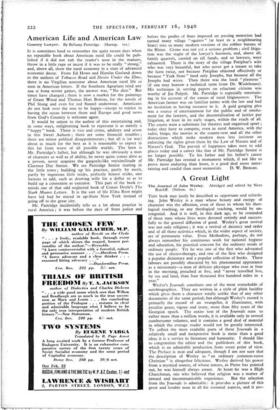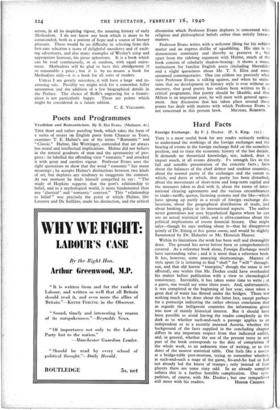A Great Light The Journal of John Wesley. Abridged and
edited by Nora Ratcliff. (Nelson. 6s.) THIS book may justly be described as opportune and refresh- ing. John Wesley is a man whose beauty and energy of character win the affection, even of those to whom his theo- logical teaching, or any theological teaching, would be un- congenial. And it is well, in this dark age, to be reminded of those men whose lives were devoted entirely and success- fully to the general diffusion of good. Wesley's great revival was not only religious ; it was a revival of decency and order and of all those activities which, in the wider aspect of society, are of permanent value. Even Methodists, perhaps, do not always remember his continuous work for national hygiene and education, his practical concern for the ordinary needs of ordinary people. Yet he was one of the first who advocated the use of electro-therapy, and one of the first who designed a popular dictionary and a popular collection of books. These labours are possibly obscured by his phenomenal appearance as a missionary—a man of delicate physique who rose at four in the morning, preached at five, and " never travelled less, by sea and land, than four thousand five hundred miles in a year."
Wesley's journals constitute one of the most remarkable of autobiographies. They are written in a style of plain lucidity which gives them a character totally unlike that of any other documents of the same period; but although Wesley's record is primarily the record of an evangelist, it illuminates, with peculiar grace, vigour and irony, more than fifty years of the Georgian epoch. The entire text of the Purnals runs to rather more than a million words, it is available only in several cumbersome volumes, and it contains a good deal of material in which the average reader would not be greatly interested. To collect the most readable parts of these journals in a relatively small and inexpensive book is more than a good idea; it is a service to literature and humanity. I should like to congratulate the editor and the publishers of this book, which is an admirable production_ from every point of view. The Preface is neat and adequate, though I am not sure that the description of Wesley as " an ordinary common-sense Christian" is altogether felicitous. Wesley derived his power from a mystical source, of whose nature, as Piette has pointed out, he was himself always aware. At heart he was a High Churchman, one who believed that religion was a matter of inward and incommunicable experience. But the selection from the journals is admirable : it provides a picture of this great and lovable man in all his essential aspects, and it pre-
serves, in all its inspiring vigour, the amazing history of early Methodism. I do not know any book which is more to be commended, both as a portent of hope and a source of literary pleasure. There would be no difficulty in selecting from this first-rate selection a score of delightful anecdotes and of excit- ing adventures, and also many examples of Wesley's crisp and appropriate humour, his pious aphorisms. It is a book which can be read continuously, or at random, with equal enjoy- ment. Methodists will be glad to have this abridgement at so reasonable a price ; but it is by no means a book for Methodists only—it is a book for all sorts of readers.
Unless I am greatly mistaken, it will have a large and in- creasing sale. Possibly we might wish for a ,somewhat fuller annotation and the addition of a few biographical details in the Preface. The choice of Roffe's engraving for a frontis- piece is not particularly happy. These are points which might be considered in a future edition.
C. E. VULLIAMY.







































 Previous page
Previous page